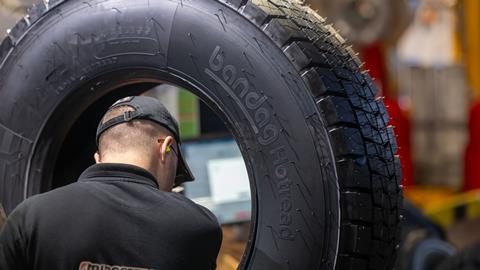Chinese tyre manufacturers are arguing that, post-Brexit, EU anti-dumping tariffs are illegal in the UK under World Trade Organistion (WTO) rules and should be dropped immediately.
The UK’s Trade Remedies Authority (TRA) is carrying out a transition review into anti-dumping tariffs on lorry and bus tyres imported from China, covering pneumatic rubber tyres, new or retreaded, and used for buses or lorries, with a load index exceeding 121. The TRA is expected to report its recommendations in November this year.
The tariffs were introduced in 2018 and resulted in a sharp decline in sales of cheap Chinese-made tyres and a resurgence in demand for retreads. Prior to the tariff the UK market saw 750,000 tyres imported from China in 2017, amounting to up to 40% of the market.
The UK transition review will consider whether, post-Brexit, the EU anti-dumping tariffs are ”necessary or sufficient” to offset dumping and what the impact would be on the UK market if the anti-dumping tariffs were no longer applied to those goods.
Chinese manufacturers have launched a concerted campaign to see the EU anti-dumping legislation overturned. In a submission to the TRA review the China Rubber Industry Association has argued that, post-Brexit, the continuation of EU imposed anti-dumping measures is illegal under WTO rules, adding that ”the UK can only remedy the situation by immediate revocation of the measures”.
The UK’s retreading industry is estimated to contribute around £230m to the UK economy each year and supports 5,500 UK jobs.
Bridgestone has recently raised concerns that budget-price truck tyres shipped in from the Far East continue to threaten sales of retreads Europe-wide, despite the imposition of the tariffs.
Andrea Manenti, Bridgestone north region vice-president, responsible for the UK and the Republic of Ireland said: “Cheap imports represent a big challenge, they’ve caused demand for retreads to fall, and have resulted in 85 retread plants shutting in Europe over the past three or four years.”
Despite the challenges these budget-price tyres pose, Bridgestone said this week it has not been deterred from investing almost £5m in its retread tyre factory in Bourne, Lincolnshire.
It believes that new equipment and a pivot away from pre-cure retreads towards the more-popular hot-cures should help boost annual output from 70,000 to 100,000 a year over the next five years.
The tyre company also believes the environmental virtues of retreads will ultimately give them the edge over budget-price offerings, pointing out that around 75% of the material used to create a new tyre is re-used when a retread is built.
Bridgestone said that fleets that opt for them will be able to cite this figure when they are tendering for work and asked to outline what they are doing to shrink their carbon footprint in the tender document.
“We firmly believe that retreads have got to replace cheap imports,” Manenti concluded.

















